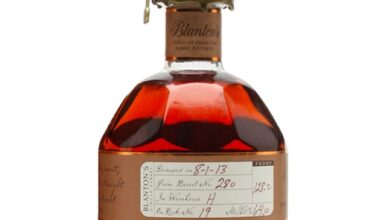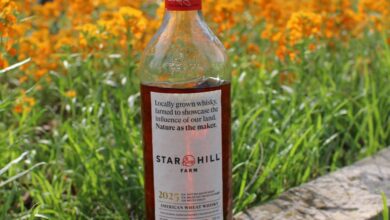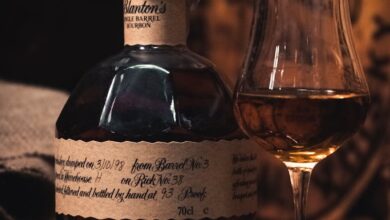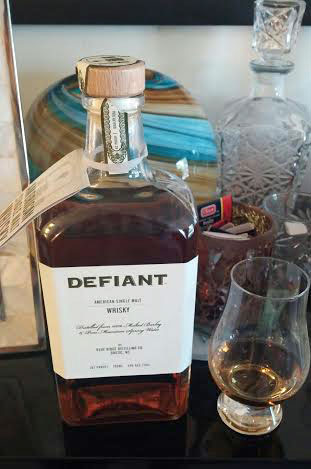Rye on Rye Ale Beer Review
Rye On Rye Ale: The Whiskey Connection
By Daniel Matthews
Rating: A

(Credit: Boulevard Brewing Company)
Plenty of you may be wondering, what is an ale doing here trespassing on whiskey’s property? But before you get out the shotgun and tell ale to go back to where it came from, let’s just say this ale is whiskey’s friend and there was an invite extended. Besides, whiskey-aged beer is nothing new to The Whiskey Reviewer.
So, this rye ale from Boulevard Brewing Company is lingering on whiskey’s porch. Or, to be precise, it lingered for a while in rye whiskey’s barrel. When I first saw Rye on Rye Ale on the shelf I had to ask, what did the whiskey connection impart to this beer? Is the friendship positive or lackluster?
To provide some macro-context on what micro-brewed beer is doing here, craft breweries are always looking to experiment and branch out. In part, this is because the craft beer craze has enabled them to do so. The craze has been brewing for a couple of decades. In 1976 it was set up in America by the Brewer’s Association’s classification of what is or isn’t a craft beer. This created a niche (some call it a bubble) within which brewers could dare to be different, within which they can experiment with flavor and distinguish themselves from big breweries. Concentration on quality yielded craft brewing an eleven percent share of the beer market last year.
The Brewer’s Association stipulates a craft brewer can’t produce more than 6 million barrels of beer a year. A microbrewery can’t produce more than 15 thousand barrels. And if the brewer alters the ingredients, going outside of the traditional malted barley, hops, yeast, and water, any change has to “enhance the flavor rather than lighten or dilute it.” That’s where Rye on Rye comes in.
The Ale
Rye isn’t the traditional grain for beer; we often associate this tough, hearty member of the wheat family first with bread, and then with whiskey. In Rye on Rye’s case, the grain yields a complex flavor because it’s interacting with hops. Spicy rye flavor is no doubt enhanced by the MGP whiskey casks the brewery got from Templeton Rye.
The amount of time any beer has to ferment will affect its alcohol level, as the yeast converts sugar from grain into alcohol. Rye on Rye had enough time to age in the whiskey barrels to where it reached 12% ABV (alcohol-by-volume). These brewers wisely understood the beer would need plenty of time to bask in the whiskey-soaked, charred oak casks—without time, this would have simply been a rye ale, sans complexity.
That complexity primarily reveals itself in the finish. The nose is smoke and orange-peel, with a hint of the caramel to come. There’s not a hint of yeast here due to the aging. The palate is a rush of alcohol. There’s a barleywine-type heaviness, but that’s offset by the hops, which assert their presence. The hops lend a wonderful burst of brightness to what otherwise would be charcoal, smoke, and caramel through and through.
Hop varieties here are Citra and Ahtanum. No doubt the brewmaster calculated these particular hops would provide a much-needed contrast. The hop citrus does an interesting tango with two kinds of malted rye, imparting citrus zest and rye spice to the palate. Because this is an ale, not a porter or stout, mouthfeel is somewhat crisp, not chewy—it goes down with surprising quickness.
And the finish. This ale is worth it for the finish alone. Finish is reminiscent of whiskey, coating the esophagus with mellow, smoky caramel, and lingering. And I mean lingering. I could taste it for a pleasant ten minutes after imbibing.
With the 12% ABV, you’re likely to get a buzz if you let Rye on Rye go down quickly. It’s a warm buzz, something unique that speaks to the ghost of whiskey lingering still.
Rye-on-rye is a limited edition ale that has already disappeared from my local Co-op. But does it herald a new level of mature experimentation from craft brewing? And, does it speak to a new synthesis, a partnership of the craft brewing world with the whiskey world?
If we judge by the likes of Rogue Brewing Company’s incipient Rogue Spirits distillery, we are indeed at the crossroads of whiskey and craft beer. Let’s hope it continues to yield great results.
Daniel Matthews is a freelance writer and an enthusiast of all things alcohol. Please find him on Twitter @danielmatthews0





